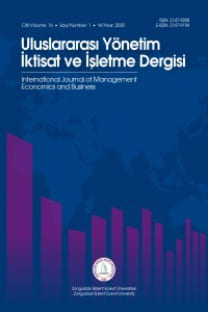ULUSLARARASI ORGANİZASYON YÖNETİCİLERİ İÇİN BAZI PRATİK ÖNERİLER
This work investigates leadership concept in the settings of international organizations. Twenty-two semi-structured interviews with supervisors, four focus group sessions with participation of 22 staffs and four non-participant observations with a three-day working schedule was conducted in the World Trade Organization, the International Trade Centre, the United Nations Conference on Trade and Development, and the World Health Organization, in Geneva-Switzerland. Regarding leadership concept, a combination of the GLOBE study, the Implicit Leadership Theory and Schein’s leadership approaches, was implemented for the first time in the existing literature. Finally, this research brought some practical recommendations for each of the separate International Organizations.
Anahtar Kelimeler:
Uluslararası Yönetim, Liderlik, Uluslararası Organizasyonlar
DEVELOPING PRACTICAL RECOMMENDATIONS FOR SUPERVISORS OF INTERNATIONAL ORGANIZATIONS
This work investigates leadership concept in the settings of international organizations. Twenty-two semi-structured interviews with supervisors, four focus group sessions with participation of 22 staffs and four non-participant observations with a three-day working schedule was conducted in the World Trade Organization, the International Trade Centre, the United Nations Conference on Trade and Development, and the World Health Organization, in Geneva-Switzerland. Regarding leadership concept, a combination of the GLOBE study, the Implicit Leadership Theory and Schein’s leadership approaches, was implemented for the first time in the existing literature in the context of international organizations. Finally, this research brought some practical recommendations for each of the separate International Organizations
___
- Ang, S., Dyne L. V., Koh, C., Ng, Y. K., Templer, K. J., Tay, C., & Chandrasekar, A. (2007). Cultural intelligence: Its measurement and effects on cultural judgment and decision making, cultural adaptation and task performance. Management and Organization Review, 3(3), 335-371.
- Annan, K. (1998). Report on the work of organization. United Nations Secretariat, New York.
- Annan, K. (2000). The role of United Nations in the 21st century. United Nations Department of Public Information, New York.
- Chen, X. P., Liu, D., & Portnoy, R. (2012). A multilevel investigation of motivational cultural intelligence, organizational diversity climate and cultural sales: Evidence from U.S. real estate firms. Journal of Applied Psychology, 97(1), 93-106.
- Chevrier, S. (2003). Cross-cultural management in multinational project groups. Journal of World Business, 38, 141-149.
- Christiansen, B., & Sezerel, H. (2013). Diversity management in transcultural organizations. Global Business Perspective, 1(2), 132-143.
- Doeveren, V. V. (2011). Rethinking good governance. Public Integrity, 13(4), 01-318.
- Earley, P. C., & Gibson, C. B. (2002). Multinational work teams: A new perspective. Mahwah, NJ: Lawrence Erlbaum.
- Earley, P. C., & Ang, S. (2003). Cultural intelligence: An analysis of individual interactions across cultures. Palo Alto: Stanford University Press.
- Haque, M. S. (2004). New public management: Origins, dimensions and critical implications. In K. K. Tummala (Ed.), Public administration and public policy. Oxford: Eolss Publishers Ltd.
- Hofstede, G. (1980). Motivation, leadership, and organization: Do American theories apply abroad. Organizational Dynamics, 9(1), 42-63.
- House, R. J., Hanges, P. J., Javidan, M., Dorfman, P. W., & Gupta, V. (2004). Culture, leadership, and organizations: The GLOBE study of 62 societies. California: SAGE Publications.
- Howell, K. E. (2000). Discovering the limits of European integration: Applying grounded theory. New York: Nova Science Publishers.
- Johnson, J. P., Lenartowicz, T., & Apud, S. (2006). Cross cultural competence in international business: Toward a definition and a model. Journal of International Business Studies, 37, 525-543.
- Lewis, R. D. (2006). When cultures collide. 3d ed., Boston: Nicholas Brealey International.
- Lord, R. G., & Maher, K. J. (1991). Leadership & information processing. London: Unwin Hyman.
- McClelland, D. C. (1961). The achieving society. Princeton, NJ: Van Nostrand.
- Missoni, E. (2014). Transnational hybrid organizations, global public-private partnerships and networks. In E. Missoni and D. Alesani (Eds.), Management of international institutions and NGOs. Oxon: Routledge.
- Morrel, D. L., Ravlin, E. C., Ramsey, J. R., & Ward, A. K. (2013). Past experience, cultural intelligence and satisfaction with international business studies. Journal of Teaching in International Business, 24(1), 31-43.
- Ngaire, W. (1999). Good governance in international organizations. Global Governance, 5(1),1-21.
- Prewitt, J., Weil, R., & McClure, A. (2011). Developing leadership in global and multi-cultural organizations. International Journal of Business and Social Science, 2(13), 13-20.
- Schein, E. H. (2004). Organizational culture and leadership. 3rd ed., San Francisco: Jossey- Bass Inc.
- Skalen, P. (2004). New public management reform and the construction of organizational identities. The International Journal of Public Sector Management, 17(3), 251-263.
- Templer, K. J., Tay, C., & Chandrasekar, N. A. (2006). Motivational cultural intelligence, realistic job preview, realistic living conditions preview and cross-cultural adjustment. Organization Management, 31,154-173.
- Thorn, I. M. (2012). Leadership in international organizations: Global leadership competencies. The Psychologist-Manager Journal, 15, 158-163.
- Williams, W., & Lewis, D. (2008). Strategic management tools and public-sector management: The challenge of context specificity. Public Management Review, 10(5), 653-671.
- Woods, N. (2000). The challenge of good governance for the IMF and the World Bank themselves. World Development, 28(5), 823-841.
- World Bank, (1989). From crisis to sustainable growth- sub-Saharan Africa: A long-term perspective study. Washington DC: The World Bank.
- ISSN: 2147-9208
- Başlangıç: 2005
- Yayıncı: Zonguldak Bülent Ecevit Üniversitesi
Sayıdaki Diğer Makaleler
G20 ÜLKELERİNDE EMİSYONLAR VE GSYH ARASINDAKİ İLİŞKİ
Oytun MEÇİK, Mustafa KARABACAK
İŞGÜCÜNÜN DIŞINDAKİ KALABALIK: EV İŞLERİYLE UĞRAŞANLARIN BELİRLEYİCİLERİ ÜZERİNE BİR ANALİZ
BANKACILIK SEKTÖRÜNDEKİ SOSYAL PAZARLAMA UYGULAMALARININ ETİK İKLİM VE ÖRGÜTSEL BAĞLILIĞA ETKİSİ
MAKROEKONOMİK VOLATİLİTENİN EKONOMİK BÜYÜME ETKİLERİ: AVRUPA BİRLİĞİ ÖRNEĞİ
ÖRGÜTSEL BAĞLAMDA KİŞİ-GRUP UYUMU (KURAMSAL PERSPEKTİF)
Işık ÇİÇEK, İsmail Hakkı BİÇER, İdil V. EVCİMEN
TÜRK TEKSTİL VE HAZIR GİYİM SEKTÖRÜNDE ULUSLARARASI REKABET
KAMU GÜVENLİĞİNİN SAĞLANMASINDA WEBERYEN BÜROKRASİ VE HİYERARŞİ KAVRAMI
Eyüp Burak CEYHAN, İsmail Fatih CEYHAN, Ebru DEMİRYÜREK, Rumeysa BODUR
